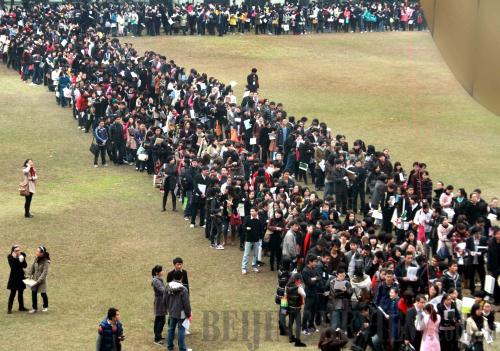|
 |
|
CRUCIAL SELECTION: Students wait for admission into a job fair in Jinhua, Zhejiang Province, on December 11, 2010. Due to a tight employment market, a large number of college graduates have to endure hardships in big cities in hopes of brighter futures (GE YUEJIN) |
On the eve of the lunar Chinese New Year which fell on February 3 this year, alone in a rented room in Tangjialing Village on the north edge of Beijing City, Deng Kun is surrounded by a computer, a bag of frozen dumplings and a bottle of liquor. Yet he feels empty. Firecrackers are exploding outside, making his heart ache. For seven days, he has not gone outside or talked to anyone.
Deng's friends all went back to their hometowns. He didn't for he is too embarrassed to go. It has been two years since he graduated and he hasn't accomplished anything.
This is a scene in Ant Tribe, an influential book published in 2009. Deng is a character in both Ant Tribe and its sequel Ant Tribe II released at the end of last year.
Ant Tribe sheds lights on low-income college graduates residing in crowded quarters on the edge of Beijing such as Tangjialing Village.
It's publication struck a chord with many people, and put "ants" and Tangjialing under the media spotlight.
Ant Tribe II also studies such groups not only in Beijing, but also in other big cities such as Shanghai, Wuhan in central Hubei Province, Guangzhou in southern Guangdong Province, Chongqing, Nanjing in eastern Jiangsu Province and Xi'an in northwestern Shaanxi Province.
Lian Si, the author of these two non-fiction books, is a young associate professor at the University of International Business and Economics in Beijing.
Lian labels these struggling young people "ants" as he finds the characteristics of ants in them: clever, weak and living in groups.
Ant Tribe says most of the "ants" are aged between 22 and 29, and graduated from universities no more than five years ago.
A majority work on unsophisticated technical jobs or in the service industry doing jobs like insurance agents, electronic products sales representatives and waiters or waitresses, and some are unemployed.
They make an average monthly income of 1,956 yuan ($300), and can save little. Their average income is lower than urban employees and college graduates who graduated six months before.
The "ants" usually live in a cramped area on the edge of cities where rent is relatively low, each taking up an average living area of less than 10 square meters and paying an average monthly rent of 377 yuan ($57).
The research team led by Lian estimates there are more than 1 million "ants" across the country.
Clever and weak
Born in an ordinary family in Yuncheng County in north China's Shanxi Province in the mid-1980s, Deng graduated from a university in southwestern Yunnan Province in 2007, and came to Beijing in 2008. He stayed with a childhood friend who lived in Tangjialing.
Deng previously thought he would buy an apartment in Beijing within two years.
But he could not find a decent job, and his dream to be a home-owner became even more unattainable as Beijing's housing prices soared.
Yet Deng did not think of himself as a loser. "It is just that I have not succeeded," he said.
In Ant Tribe II, Deng appears as an "ant" in Yunnan Province. He left Beijing in early 2010. He said he did not like Beijing because people there have a sense of superiority, not because they themselves are brilliant, but because they were born in Beijing, and their parents (social connections) are there.
Deng did not go back to his hometown. There was not much for him to do there, he said. Without social contact, finding a good job there was also difficult.
| 